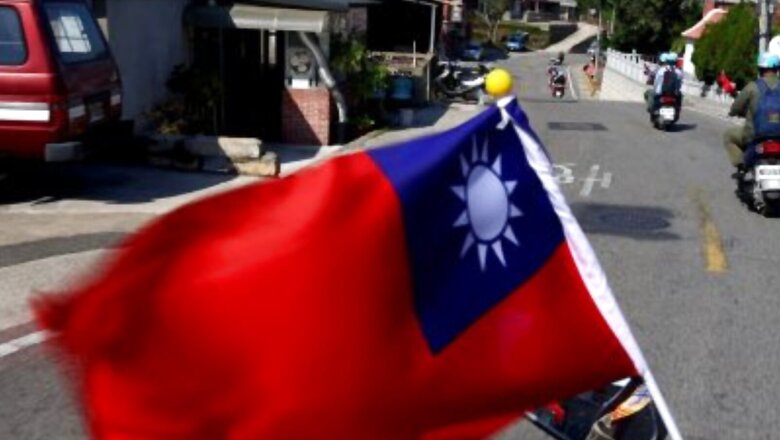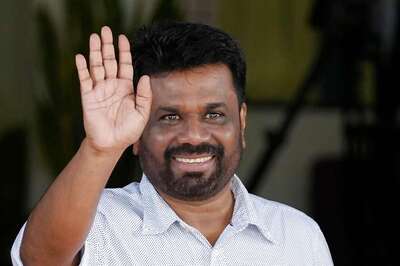
views
Even as Russian tanks roll over the open plains of the Ukrainian heartland, Chinese planes have taken to the skies over Taiwan. As the world has watched Ukraine attempt to defend against the overwhelming strength of its neighbour, Taiwan and the People’s Republic of China remain at daggers drawn. Ukraine’s predicament has sparked fears that China may use the West’s preoccupation with the crisis unfolding in Europe to take military action against Taiwan. Scarcely a few days ago, Taiwanese Foreign Minister Joseph Wu sent alarm bells ringing when he called for American support to deter a Chinese invasion. For several reasons, that seems like an unlikely proposition in the near term.
To begin with, China is in the midst of a sea change in its domestic politics. President Xi Jinping has defied the traditional two-term limit on Chinese leaders and now seeks to secure an unprecedented third term in office. With this in mind, Xi hopes to cement his iron grip over the reins of power at the Chinese Communist Party’s (CCP) 20th Congress slated for late 2022. Even as he ratchets up the pressure on Taiwan, President Xi can ill-afford a risky military venture in the run-up to his Red Coronation. Even if Xi were to secure another term, his comprehensive domestic political agenda will take priority over his desire to bring Taiwan back into the fold.
Sitting in his cloistered compound in Beijing’s Zhongnanhai neighbourhood, China’s paramount leader has cracked down on tech companies, reigned in the worst excesses of his country’s real estate boom and has launched a campaign of “Common Prosperity”. His goal is as simple to state as it is complex to achieve: a decisive shift away from China’s manic focus on growth rates and towards a focus on equity and quality of life issues. Re-engineering China’s domestic political culture will prove a mammoth task with no small degree of political opposition. As Xi strives to build China 3.0, a military operation in Taiwan might risk precious political capital and jeopardise his grand plans. Xi understands that his country’s future in the world order depends far more on tackling the nation’s massive debt crisis, rampant inequality and worsening demographic dividend than on the conquest of Taiwan.
Taiwan’s Strategic Importance for US, Japan
Xi’s China has another good reason to hold off on military operations: it believes time is on its side. Numerous analyses have suggested that the Chinese armed forces lack key capabilities necessary to sustain an all-out campaign against Taiwan. However, in the last few decades, Beijing has undertaken an aggressive campaign of modernisation that aims to transform the country into a world class power by 2049. As of 2017, American think-tank RAND estimated that China would enjoy a distinct advantage in some key operational areas in the event of a conflict over Taiwan. Beijing remains confident that the regional balance of power will continue to shift decisively in its favour. As such, risking a military offensive at this time seems a risk the CCP is unlikely to take.
China’s success in a military operation against its island neighbour is also less certain for an important reason: unlike Ukraine, Taiwan is strategically vital to American power. For starters, the island is home to the Taiwan Semiconductor Manufacturing Corporation (TSMC), the world’s most sophisticated manufacturer of vital semiconductors. One supply chain crisis and several billion dollars in losses later, the world has come to understand that a disruption in the stable supply of semiconductors could bring the global economy to its knees. Taiwan’s position at the heart of this supply chain will necessitate US intervention in the event of a Chinese offensive.
In addition, the island sits athwart enormously lucrative sea lanes that serve as the arteries of global trade. Beijing could potentially use Taiwan as a foothold to cut off adversaries like Japan from trade and supplies of oil. Perhaps in recognition of this, Japan’s longtime Prime Minister and major power broker Shinzo Abe recently pushed for Japanese involvement in case of a conflict over Taiwan. As such, Beijing would find itself in the crosshairs of the US-led alliance in Asia. Even as Xi hopes to lead his country away from technological dependence, China remains heavily dependent on Taiwan for the latter’s cutting edge fabrication of semiconductors. A military conflict that jeopardises the security of semiconductor fabrication facilities would have damaging consequences for key industries in China like automobiles and electronics among countless others.
ALSO READ | Writing from Taiwan: How Taipei Has Reacted to Russian Invasion of Ukraine, What Makes It Anxious
Taiwan’s Military Power
Finally, there is Taiwan’s not inconsiderable military power. The island’s mountainous terrain and the rough seas surrounding it have sorely tested many conquerors in the island’s history. The island also possesses a large standing military backed by US armour and equipment. A full-fledged invasion of Taiwan would require Beijing to mobilise a massive force, around 1.2 million by some estimates, to reasonably assure its success. Even if the People’s Liberation Army were to succeed in taking Taiwan, the costs could be staggering. Over the last few years, Taiwan’s military has shifted to a “Porcupine Strategy” designed to make the costs of a Chinese military offensive prohibitive. By investing in a “large number of small things”, the island nation is developing low-cost, precision military systems that can damage and wear down the PLA.
Should Beijing attempt to invade or blockade the island, it can expect heavy losses in men and manpower at best and the prospect of a humbling defeat at the hands of Taiwanese and US-led forces in the region. Neither is an acceptable outcome for a regime that has built its legitimacy on its military success in unifying China and restoring its status as a great power. Accordingly, Beijing’s military provocations in recent months don’t presage a brutal invasion. Rather, it is flexing its military muscle in order to bring Taiwan’s domestic politics back in line. The One China Principle, which states that the PRC and Taiwan form one Chinese nation, is the basis of Beijing’s claims over the island and its 23 million denizens. While once content to live in its larger neighbour’s shadow, Taiwan now seeks to assert its separateness from Beijing by refusing to endorse the Principle. By filling the skies with its aircraft and provoking repeated standoffs with Taipei, China hopes to leverage its military superiority and force Taiwanese politicians to accept the well-worn One China Principle.
To be sure, these factors do not rule out the possibility of a Chinese invasion or blockade in the future. Should domestic difficulties give rise to citizen discontent, the CCP would not be above attempting an invasion or blockade of Taiwan in a bid to restore its popularity at home. Further, the Russian invasion of Ukraine has demonstrated that a sense of historical grievance can drive major powers to military action at great cost to themselves. For the CCP, capturing Taiwan and unifying China under their banner is a historic mission and the source of the Party’s political legitimacy. As China’s relative military power grows, a reckoning over Taiwan in the decades to come remains a distinct possibility.
While military action seems unlikely in the immediate future, America and its allies in the region must maintain an unwavering vigil to defend against Chinese designs on Taiwan.
The author is a research associate, strategic studies programme, Observer Research Foundation (ORF). The views expressed in this article are those of the author and do not represent the stand of this publication.
Read all the Latest Opinion News and Breaking News here




















Comments
0 comment